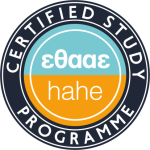Undergraduate Studies
Outline
The education system in Greece is based on semesters. There are two semesters per academic year (Fall and Spring) according to the Academic Calendar after a Senate's decision (see below). Students admitted for undergraduates studies need 10 semesters (5 years) in order to graduate, that is to obtain the diploma of Pharmacy (“Ptychion” in Greek). During each semester a student has to follow ca. 4 to 6 courses with a total of around 24-39 hrs of attendance per week.
A course can consist of Lectures or Lectures and practical work (Laboratory). The courses offered in our Department are grouped in semesters (Fall and Spring). Lectures can be followed by students at will, whereas attendance of Laboratories is mandatory. In most courses there is not any formal assessment throughout the semester. In rare cases, Lecturers offer partial exams within the semester and the grades obtained at these exams are taken into account in the final mark. However, in the Labs the students are constantly examined usually orally on the theory and practice for each experiment they are to perform before or during their Lab work and finally have to present written account of their results one week after the end of each exercise. All these are taken into account in the final mark together with the results of the final written examination that is associated with each particular Lab. Failure to successfully perform up to 20% of the Laboratory sessions results in the obligation for the student to make up the lost sessions by additional Laboratory work. In cases in which students missed more than 20% of the Laboratory work accompanying a course, they are not allowed to take the final exam of the course. The exam can only be taken after the successful completion of the Laboratory work. The Laboratory work usually includes four to six Laboratory units per semester.
Courses are offered in the Greek language and the faculty members teach the related material based on Greek textbooks. These textbooks usually are either the exact translation of the English counterparts or are based on them. Thus the content and the level of these Greek textbooks are similar to the corresponding english ones. For an ECTS student whose native language is not greek and his/her greek is not good enough to be able to study from a greek textbook there can always be easily found an english textbook with similar content to that his/her fellow greek students use. These textbooks are offered on loan by our university central library.
During their final year and in addition to the courses they follow the students have to carry out a short research project called Diploma Work under the supervision of a member of the academic staff. At the end of this work, students have to provide a written account of their results and often to present them orally. A grade is then assigned to the student by the supervisor involved reflecting the overall performance of the student. This grade should be at least 5 for a successfully completed Diploma Work. A senior year student is also required to make study visits to both Pharmaceutical Industries and Drug Stores. The duration of the practice period is approximately two semesters. Credit for this activity is given through the courses named Pharmaceutical Practice I & II. The grade assigned for these courses is the average of student performance, student reports and final examination grade.
A course is considered as being successfully passed only when the student has acquired at least the grade 5 out of 10 in the associated exams. The grading scheme, based on a 0 to 10 scale is as follows:
EXCELLENT 8.5 to 10
VERY GOOD 6.5 to 8.5
GOOD 5.0 to 6.5
UNSATISFACTORY 0 to 5.0
The minimum passing grade is 5.0 and all the grades are expressed as integers. However a course associated with Lab work requires in addition also successful completion of the Lab work and for the final mark both the grade in the exam and the Lab performance are considered with factors which vary from Lab to Lab. Exams are offered to the students after the end of each semester and repeat exams in September. However students who have failed in these exams or not participated at all can sit for these exams as many times as they wish in the following exams periods. A student is considered as having completed his/her studies in our Department only when he/she has passed all the exams associated with all courses consisting our curriculum.
Taking into account the Greek higher education system the basic requirements of the ECTS system for 30 credits for each semester was met in the Department by initially assigning for each 1 hr per week per semester of Lecture and Lab work 1 ECTS credit. Additional ECTS credits were then added to those of the course that are considered as the most hard for the students to be passed that is those requiring higher student workload.
ECTS students who have studied for at least a year in our institution can be considered as candidates to obtain the Diploma (Ptychion) in Pharmacy offered by the Department for undergraduate studies. The ECTS Committee of our Department dealing with the recognition of studies carried out abroad will consider students transcripts of records and their performance at our Department. Courses successfully completed abroad will then correlated to those in Patras. If there is no need for additional courses to be taken by the student in Patras in order to fulfil the requirements imposed by our curriculum this committee will propose the General Assembly of the Department to offer our Diploma (Ptychion) to that particular student. Otherwise, the student will have to attend and successfully pass all those courses that are needed to complete our curriculum.
Curriculum & Courses for 2025-2026
Starting from the Academic Year 2016-2017, the Department's Assembly redesigned and reformed the Curriculum of the Department of Pharmacy in order to cover modern scientific fields, as well as to comply with the corresponding European Union standards.
Courses are explicitly described in individual sheets linked to each one in the Curriculum Program.
A cumulative volume of all Courses Outlines can be downloaded from this link.
Academic calendar 2025-2026
|
Start |
End |
|
|
Fall Semester Courses |
29.09.2025 |
09.01.2026 |
|
Fall Semester Exams |
19.01.2026 |
06.02.2026 |
|
Spring Semester Courses |
16.02.2026 |
29.05.2026 |
|
Spring Semester Exams |
08.06.2026 |
26.06.2026 |
University Holidays & Days-off
The University academic year runs from September to June.
- 28 October: The Ochi Day [National Celebration]
- 17 November: Polytechneio Day [Anniversary of the 1973 Students’ uprising in the National Technical University of Athens against the junta]
- 30 November: St. Andrew Day [Patron Saint of the city of Patras]
- 24 December - 6 January: Christmas holidays
- January 30: The Three Holy Hierarchs [Celebration of the Education Day] Clean Monday [Orthodox Shrove Monday, Movable]
- 25 March, Dual holiday: 1. Anniversary of the declaration of the start of Greek War of Independence from the Ottoman Empire, in 1821. 2. Celebration of the Annunciation of the Lord.
- Orthodox Easter Holidays [Movable]
- 1 May: Labor Day
- 9 June: Holy Spirit Monday
- Students’ Elections Day [Spring, Movable]
Secretariat
The Administration is open to inquiries by Students Mon-Fri, 10:00-14:00.
+302610962300




